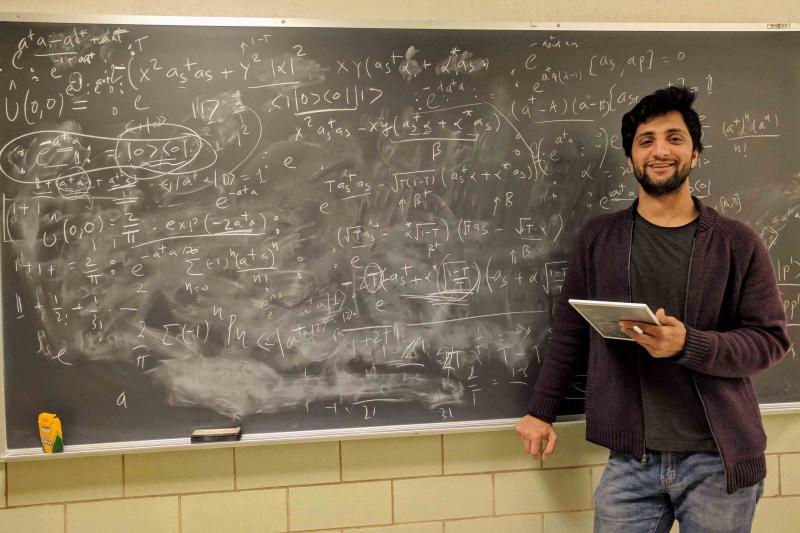Physics Grad Paves the Way for a Quantum Leap in Computer Science

Ever found yourself running to escape a sudden downpour on a day when the weather app on your phone predicted nothing but sunshine? What about those times you’re left wondering why your grocery store always seems to be out of toilet paper while others remain fully stocked?
Computers play a large part in solving problems involving weather forecasts and supply-chain logistics today, and while they can be surprisingly effective at accomplishing some tasks, they still have significant limitations when it comes to solving problems like optimizing the distribution of products across a distribution network or making predictions based on highly complex sets of variables.
However, thanks to the work of Rajveer “Raj” Nehra, a member of the College and Graduate School of Arts & Sciences’ graduating Class of 2020, researchers are getting closer to inaugurating a new age of quantum computing that could revolutionize the way computers solve big problems.
Unlike classical computing (i.e., your desktop computer or your cellphone) in which the basic unit of information called a “bit” can have only one of two values — a zero or a one — the basic unit of quantum computing, known as a quantum bit or “qubit,” can have an infinite number of values.
“By harnessing these quantum properties, quantum computers are profoundly more capable of solving certain problems much faster than the most advanced supercomputers available today,” said Nehra, who completed his Ph.D. in physics at UVA last spring.
It’s a technology, he added, that could lead to unprecedented advances in science, medicine, economics and artificial intelligence.
But while the field has progressed significantly over the last decade, scientists haven’t yet managed to build fully functional quantum computing devices.
“In order to develop this kind of technology, you need to characterize these quantum systems. You need to make sure that your device is generating the physical system you want it to, and that’s what my research has been about,” Nehra said. “By using accurately characterized quantum systems, we can fully exploit the advantages offered by quantum technology.”
Computing with Light
One approach to creating functional quantum computing systems involves using light waves, and some of the leading-edge research in the field of quantum optics is being conducted by Olivier Pfister, a professor in the College’s Department of Physics.
After finishing his undergraduate degree in physics at the Indian Institute of Science Education and Research in Mohali, Nehra said, “I was looking for graduate schools, and I came across a paper by Professor Olivier Pfister about generating a large entangled quantum states of light in his lab. And I thought, ‘that is something I would be interested in.’”
The chance to learn more about Charlottesville’s history and to explore the Blue Ridge Mountains also appealed to him as an international student.
One of the objectives of Pfister’s team is to create an experimental model of a quantum computing system that could form the basis of a working quantum computing device. An important part of that process involves finding new ways of measuring light.
“And that’s what Raj did,” Pfister says. “He’s been incredibly creative at coming up with new ideas. Raj invented new ways of measuring light — the quantum state of light, characterizing this completely by doing photon number measurements.”
“Working in the lab is exacting and demanding work,” Pfister said, “but Raj has gone above and beyond all this in terms of being able to do very demanding experiments and solve problems at a world-class level.”
But even though science is moving steadily closer to developing fully functional quantum computers, it’s unlikely that they will replace desktops or run the applications most people use at home or at work.
“Quantum computers are not going to run Excel better or do email better than classical computers. It's a completely different world and a completely different set of rules, but there are things that quantum computers can do that classical computers cannot do well,” said Pfister,
Most likely, the first challenges posed to quantum computers will be to augment the computing capacity of conventional computers, helping manage investment portfolios, accelerating pharmaceutical research, developing more effective weather models or optimizing global supply chains to ensure that products get to the consumers who need them.
Starting a New Chapter
For his hard work and innovative thinking, Nehra won the 2020 Allan Talbott Gwathmey Memorial Award, an honor that recognizes accomplished graduate students in the physical sciences. In his final year as a grad student at UVA, he also won a 2020 Outstanding Graduate Research Award in Physics. To cap off his outstanding career on Grounds as a grad student, Nehra was selected to complete a post-doctoral fellowship at Cal Tech where he will continue to work on quantum computing systems.
The road from Mohali to Charlottesville and from undergrad to post-doc hasn’t always been easy, Nehra admitted.
“There were times where my experiments failed, my papers were rejected, my ideas didn’t work, but that is where you grow as an individual researcher. You develop your perseverance, you change your perspective, you look at things from different angles, and then one day it all just clicks, and it’s completely worth it.”




